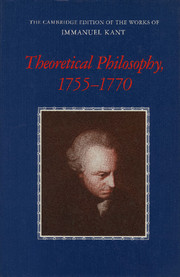Book contents
- Frontmatter
- Contents
- General editors' preface
- Preface
- Guide to abbreviations
- General introduction
- Introductions to the translations
- Résumés of the works
- A NEW ELUCIDATION OF THE FIRST PRINCIPLES OF METAPHYSICAL COGNITION (1755)
- THE EMPLOYMENT IN NATURAL PHILOSOPHY OF METAPHYSICS COMBINED WITH GEOMETRY, OF WHICH SAMPLE I CONTAINS THE PHYSICAL MONADOLOGY (1756)
- AN ATTEMPT AT SOME REFLECTIONS ON OPTIMISM (1759)
- THE FALSE SUBTLETY OF THE FOUR SYLLOGISTIC FIGURES (1762)
- THE ONLY POSSIBLE ARGUMENT IN SUPPORT OF A DEMONSTRATION OF THE EXISTENCE OF GOD (1763)
- ATTEMPT TO INTRODUCE THE CONCEPT OF NEGATIVE MAGNITUDES INTO PHILOSOPHY (1763)
- INQUIRY CONCERNING THE DISTINCTNESS OF THE PRINCIPLES OF NATURAL THEOLOGY AND MORALITY (1764)
- M. IMMANUEL KANT'S ANNOUNCEMENT OF THE PROGRAMME OF HIS LECTURES FOR THE WINTER SEMESTER 1765 — 1766 (1765)
- DREAMS OF A SPIRIT-SEER ELUCIDATED BY DREAMS OF METAPHYSICS (1766)
- CONCERNING THE ULTIMATE GROUND OF THE DIFFERENTIATION OF DIRECTIONS IN SPACE (1768)
- ON THE FORM AND PRINCIPLES OF THE SENSIBLE AND THE INTELLIGIBLE WORLD [INAUGURAL DISSERTATION] (1770)
- Factual notes
- Bibliographies of editions and translations
- Glossary
- Biographical-bibliographical sketches of persons mentioned by Kant
- Index
General introduction
Published online by Cambridge University Press: 18 December 2014
- Frontmatter
- Contents
- General editors' preface
- Preface
- Guide to abbreviations
- General introduction
- Introductions to the translations
- Résumés of the works
- A NEW ELUCIDATION OF THE FIRST PRINCIPLES OF METAPHYSICAL COGNITION (1755)
- THE EMPLOYMENT IN NATURAL PHILOSOPHY OF METAPHYSICS COMBINED WITH GEOMETRY, OF WHICH SAMPLE I CONTAINS THE PHYSICAL MONADOLOGY (1756)
- AN ATTEMPT AT SOME REFLECTIONS ON OPTIMISM (1759)
- THE FALSE SUBTLETY OF THE FOUR SYLLOGISTIC FIGURES (1762)
- THE ONLY POSSIBLE ARGUMENT IN SUPPORT OF A DEMONSTRATION OF THE EXISTENCE OF GOD (1763)
- ATTEMPT TO INTRODUCE THE CONCEPT OF NEGATIVE MAGNITUDES INTO PHILOSOPHY (1763)
- INQUIRY CONCERNING THE DISTINCTNESS OF THE PRINCIPLES OF NATURAL THEOLOGY AND MORALITY (1764)
- M. IMMANUEL KANT'S ANNOUNCEMENT OF THE PROGRAMME OF HIS LECTURES FOR THE WINTER SEMESTER 1765 — 1766 (1765)
- DREAMS OF A SPIRIT-SEER ELUCIDATED BY DREAMS OF METAPHYSICS (1766)
- CONCERNING THE ULTIMATE GROUND OF THE DIFFERENTIATION OF DIRECTIONS IN SPACE (1768)
- ON THE FORM AND PRINCIPLES OF THE SENSIBLE AND THE INTELLIGIBLE WORLD [INAUGURAL DISSERTATION] (1770)
- Factual notes
- Bibliographies of editions and translations
- Glossary
- Biographical-bibliographical sketches of persons mentioned by Kant
- Index
Summary
Immanuel Kant was born in Königsberg on 22 April 1724 to Pietist parents of modest means. His precociousness attracted the attention of Franz Albert Schultz (1692–1763), who arranged for the eight-year-old boy to enter the Collegium Fridericianum, of which he was the rector. The young Kant was thus exposed to the powerful spiritual and intellectual influence of Schultz, who was both a Pietist and a follower of Wolff, under whom he had studied at Halle. Kant's eight years at the Fridericianum were devoted largely to the study of classical languages (especially Latin) and religion. His final years at school were overshadowed by the death of his mother in 1737.
In 1740, the sixteen-year-old Kant began his studies at the Herzog Albrecht University in Königsberg. He seems to have read mathematics, natural science, and philosophy. The crucial influence on Kant during this period was that of Martin Knutzen (1713–51). Only eleven years older than Kant, Knutzen likewise was both a Pietist and a follower of Wolff. He was also a Newtonian, and he introduced Kant to the new physics. Kant attended Knutzen's lectures on mathematics, astronomy, and natural science, and it was probably Knutzen who led Kant to the theme of his first work, Living Forces (1747).
The death of his father and the completion of Living Forces in 1746 marked the end of Kant's six years as a student at Königsberg. Straitened financial circumstances constrained the twenty-four-year-old Kant to interrupt his university career for some eight years to take employment as a tutor with a succession of families in the Königsberg area. He clearly contrived to combine his philosophical and scientific interests with his tutorial duties, for his return to Königsberg in 1754 was marked by the publication of two short works of considerable scientific originality and one major work of indisputable scientific genius, Universal Natural History (1755), in which Kant, with characteristic self-assurance, out-Newtoned Newton by offering a purely mechanical account of the structure and motions of the universe.
- Type
- Chapter
- Information
- Theoretical Philosophy, 1755–1770 , pp. xxxv - xlviiiPublisher: Cambridge University PressPrint publication year: 1992

